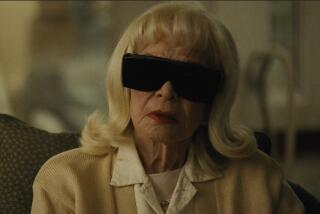The Painful Untying of Apron Strings : THE ONLY PIECE OF FURNITURE IN THE HOUSE by Diane Glancy; Moyer Bell $18.95, 160 pages
- Share via
Flying is the nestling’s illusion; once out of the nest, it’s all effortful wing-flap and the thud-thud of updrafts. In the disconsolate voice of Rachel Hume, daughter of an itinerant Gulf Coast family, we hear a young woman lament the change from basking in the bustle and warmth of her redoubtable mother to trying to devise bustle and warmth for a green, young husband and a needy baby.
In the gospel and Pentecostal rhythms of the coastal South, Diane Glancy writes--almost more as a ballad than a story--about a passage of life that our urban culture tends to ignore: not growing pains but the pain of growing.
The Hume family’s truck would jounce from Texas to Louisiana and back again, following the railroad jobs of Woody, the father. Eight or nine children crowded in and Rachel, snug under the meaty arm of her mamma, Bethanna, would trace the insects smashing against the windshield, nod to Bethanna’s hymn-humming, and doze off counting the road signs: Madill, Poteau, Nacogdoches, Runnels, Waxachie, Dead Smith, Scurry. . . .
It was hard times for the Humes, but Bethanna, a devout fundamentalist Christian, tackled it all with great energy and constant activity. She and her mother, another large spirit, cooked splendid Creole dishes, nursed the children when sick and worked them when well, went to church, sang and prayed. Whether in Texas, where they spent winters and the children went to school, or in Pole Cat Creek in the Louisiana bayous, where they took a summer shack and fished for crawfish, they lived a life that never flagged.
Or so it seemed to Rachel. The high voltage of the Humes made a safety zone for her when a young soldier, Jim, began to press her for dates and more. She lusted for him but held off, citing Bethanna. In a spirited, comic series of brief scenes, Glancy has Jim move from exasperated scorn for the Hume pieties to a teary coming-to-Jesus at their church. Bethanna, who likes him from the start but gives him a hard time, is satisfied and the wedding goes ahead.
Suddenly in their scruffy barracks quarters, with strangers all around, Rachel’s passion for Jim is eclipsed by her longing for Bethanna and what she seemed to represent. Her mother was life and vitality; she was “the only piece of furniture” in whatever house they occupied in their peregrinations. Rachel can’t find in herself what seemed, in her mother, to be magic.
It is a long crisis, marked by Rachel’s difficult pregnancy and surgical delivery, a two-year breakdown, Jim’s heroic patience, followed by anger and an affair, trips back home to try to plug in to her mother’s flagging vitality, and advice from ministers, sisters and Bethanna herself.
Is she unhappy because the surgery will prevent her from having more children? one of the ministers asks. No, she says, she can adopt them. “But it’s having the responsibility of them without Bethanna who made everything fun. It’s having to originate everything I do by myself and finding it all so empty. I want to retreat into Bethanna and never come out.”
There is a high-wrought lyrical quality to Rachel’s narrative that can be estranging, at times. Glancy conveys her religion-touched spirit and the exclamatory mysticism of her upbringing; and it is absolutely necessary to her character, though her frequent sighting of tiny, bug-like “angels” made me wonder if there can be heaven without insect spray.
For the most part, though, her poetic intensity suggests a real anguish; a particular case of a larger human sorrow. If we come into the world trailing clouds of glory, it can be desolate work to be the weathermen for the next generation’s clouds. Resigning herself to becoming “the only piece of furniture” for her husband and child, Rachel reflects bleakly:
“I knew we couldn’t start over, but we were bound in events since the beginning, going on, having weddings and children for more weddings and children, gathering our mistakes and shortcomings like cotton in the field, being caught from the river before we saw the hook, cleaned, salted with pepper and spice, dried and smoked for the winter with molasses and bacon.”
More to Read
The biggest entertainment stories
Get our big stories about Hollywood, film, television, music, arts, culture and more right in your inbox as soon as they publish.
You may occasionally receive promotional content from the Los Angeles Times.










